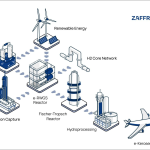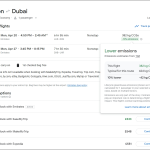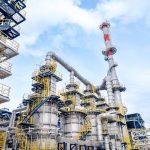Swiss renewable synthetic fuel start-up Synhelion has delivered its first consignment of sustainable aviation fuel produced using solar energy to its launch customer, Swiss International Air Lines (SWISS), part of the Lufthansa Group. A 190-litre barrel of the product has been supplied from Synhelion’s DAWN production facility in Jülich, western Germany, to a refinery in the country’s north for blending into Jet A-1 aviation fuel, then delivered to SWISS through the fuelling system at Hamburg Airport. The SAF is produced by using concentrated solar heat to power a thermochemical reactor, in which biogas extracted from mainly agricultural waste is mixed with water, creating syngas which is then converted to liquid fuel. The SAF delivery to SWISS follows the companies’ 2020 formation of a strategic partnership, and Lufthansa Group’s subsequent investment in Synhelion made in 2022.
“This first delivery of Synhelion’s solar fuel marks a genuine milestone in our long-standing partnership,” said SWISS CEO Jens Fehlinger. “This is the first time that solar fuel has been used in civil aviation. We have intentionally invested in a Swiss start-up, and we are delighted to celebrate this landmark achievement together.”
The companies said the initial volume of solar fuel was only 7% of what was needed to power a typical flight between Hamburg and Zurich but was an important step in the much bigger task of decarbonising air transport.
“Our delivery of this first barrel to SWISS may be a symbolic action,” said Synhelion’s co-founder and co-CEO Philipp Furler, “but it’s a concrete one, too, towards a more sustainable aviation sector. This milestone brings us one step closer to globally scaling up our solar fuel technology, and we’re very grateful to have such invaluable support from our partners at SWISS and the Lufthansa Group as we continue on this journey.”
The energy company is targeting certification that will enable it to offer ‘Sun-to-Liquid’ aviation, diesel and auto fuels commercially from 2027, following the activation of its DAWN plant in June last year. It states its fuel can “significantly exceed” the EU Renewable Energy Directive’s requirement for a minimum 70% reduction in GHG emissions compared to fossil kerosene and Synhelion is now working with SWISS on the sustainability certification of the production process.
Already this year it has demonstrated the new fuel powering a Harley Davidson motorcycle, an Audi car, and even an historic steamboat, the 110-year old Gallia, operated by Switzerland’s Lake Lucerne Navigation Company.
To produce its new fuel, Synhelion uses biogenic waste, mostly from agriculture, as feedstock. Through anaerobic digestion – a natural process – the waste is converted into raw biogas, a mixture of biogenic methane and CO2.
To transform the biogas into renewable fuel, Synhelion creates high-temperature process heat, either by using renewable energy from a photo-voltaic field of solar panels or its own proprietary concentrated solar system to generate heat over 1,100 degrees Celsius.
The heat is then used to power the company’s proprietary thermochemical reactor, in which biogas and water molecules combine to create syngas, a combination of hydrogen and carbon monoxide. This is then converted into liquid fuel using the Fischer-Tropsch process.
Solar energy created during the day is held by Synhelion in its thermal energy storage facility, enabling continuous operation of the fuel production plant. The company claims the system can store energy far less expensively than conventional battery storage, enabling its plants to operate for around 8,000 hours per year.
“By combining affordable feedstocks, cheap renewable energy and cost-effective thermal energy storage, we efficiently produce sustainable fuels day and night,” said Synhelion, “helping to create a cleaner, more sustainable future for global transportation.
“Renewable synthetic fuels are crucial for de-fossilising global transportation without requiring modifications to existing infrastructure, engines or vehicles. The continuous and reliable production of solar fuels at DAWN is a breakthrough for the global transition to net-zero transportation.”
Synhelion also plans to expand its solar fuel production to other European locations and has signed a Memorandum of Understanding with synthetic fuel producer INERATEC, whose Fischer-Tropsch conversion module is used in the DAWN solar fuel process.
Photo (Synhelion): A Synhelion solar jet fuel barrel in front of a Swiss International Air Lines aircraft













More News & Features
Concrete Chemicals consortium secures €350m public funding for German eSAF project
SAF One announces new investment and technology partners for Middle East SAF project
New studies confirm minor flight re-routing to avoid contrails would have major climate benefits
New initiative formed to accelerate SAF adoption and production in the Pacific Northwest
EcoCeres opens new Malaysia production facility as SAF ambition in Asia scales up
Aviation, shipping and fuel leaders convene in Rotterdam to accelerate sustainable fuels scale-up